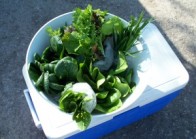Is the local food movement here to stay?
Intellectually, how could it not be? The future must necessarily be one of producing food much closer to where people live, especially as transportation costs escalate, and current food sources in the California Central Valley, in South Florida, and Texas face the extreme weather characteristic of climate change.
That said, life with food is not always about rational behavior.
Growth of organic food sales is unmistakable, with 2014 food and non-food item sales setting a new record of $39.1 billion. Organic was almost five percent of food sales, according to the Organic Trade Association.
There is good and bad organic food. When we think about it, what good is it to buy organic canned black beans produced in China more cheaply than what a local farmer can sell? Is it bad that local producers use “organic practices” yet do not secure USDA organic certification of their operations?
The good news is interest in organic food helps small-scale producers generate needed sales. As organic sales go mainstream, being found in four out of five grocery stores, a crop of informed consumers is making up 18 percent of buyers, accounting for 46 percent of organic food sales. There is room for continued growth in this segment as wider availability of organic food, and mainstream information about organic foods drive people to buy them.
Each week, I hear people explain why they buy organic food. Their reasons are diverse, and don’t always make sense. The commitment is often to “eating healthy” as opposed to any sound rationale. This attitude toward organic food can become problematic, and small-scale producers in the local food movement are particularly vulnerable. If organic is the latest fad, then long-term sustainability may be out the window for them.
Another thing people don’t mention much is as organic food becomes mainstream, large-scale players will increase their share in organic, and dominate the marketplace. Companies like Earthbound Farm Organic will become the norm, rather than the exception. Food conglomerates may establish gigantic organic food divisions as they have already done with gluten-free food. Better margins in organic food will attract capital, and small-scale farmers seem seldom have enough of that to compete.
I brought a bag of seven or eight kinds of spring greens home from the farm, reminding me of why I buy and barter for local food. I know how the farmers treat the soil, where they get seeds and rootstock, how they control pests, how they treat animals, and how they treat labor.
There is not much hope for a market based on “eating healthy.” It is not sustainable, even if organic is gaining market share.
Some of us find hope in being close to the means of production and getting our hands dirty. We also know the face of the farmer—something that gets forgotten midst the hoopla of buzzwords.
Knowing the face of the farmer is sustainable in local food systems. It is hard to replace, and it is time we got to know more of the farmers whose production we eat every day.




So ironic, that your organic food blog is “for Iowa”. Because Iowa has probably been the state that has done the most to corrupt agriculture, and destroy our food system. Every 4 years every Presidential candidate troops to Iowa and promises to subsidize agribusiness, big corn, dirty pork, ethanol, GMOs and dozens of other destructive agricultural practices. For many of us who value organic farming and food, “for Iowa” means “for destroying farm and food”. How about you heal yourself before you preach “for Iowa” to the rest of the country?
LikeLike
John,
Thanks for your comment. It looks like you are from New Hampshire, so I can understand your holding Iowa in low regard, what with your state being second in the nation in the presidential selection process, and therefore envious of our first in the nation status. Be consoled. At least you have Dixville Notch.
You should come to Iowa. I think you’d like it.
Best regards, Paul
LikeLike